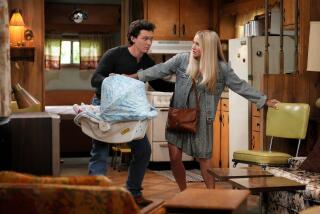‘The Big Bang Theory’ finale: The end of an era in TV programming?
It doesn’t take a rocket scientist — or geeky physicists, for that matter — to realize that the conclusion of “The Big Bang Theory,” the most-watched comedy on television and a centerpiece of one of TV’s most profitable nights, is a blow to CBS. The network had been bolstered by the prime-time powerhouse for the better part of a decade.
But the end of the series, which wraps its 12-season run Thursday, has raised another question: Is “The Big Bang Theory” the last of its kind? A relic of a departed era of television when a mainstream sitcom could command a massive audience?
While the Twitterverse has been in full theatrics over HBO’s fantasy blockbuster “Game of Thrones” as it too nears its end, it’s easy to overlook the significance of its more modest associate on broadcast television.
The comedy, which became TV’s longest-running multi-camera sitcom this season, has anchored Thursday nights since 2010 — consistently helping CBS maintain its standing as the most-watched network. While its ratings have receded in recent years, the show still commands an enviable audience. This season, it averaged 12.75 million total viewers (a number that rises to nearly 18 million when delayed viewing over a week is factored in), according to Nielsen — and it’s expected to wrap its run near the top of the ratings.
That’s a notable run against the backdrop of declining ratings, shifting viewing habits and a saturation of content as the streaming era settles into place.
“It’s bittersweet,” said Kelly Kahl, the president of CBS Entertainment, who was the head of scheduling when “The Big Bang Theory” launched. “We’re heading to a conclusion of a landscape-altering show; a show that means a lot. I think it’s more than a CBS thing. It’s a network television thing. It was a monster hit for network television — for television in general … you take it for granted that the audience will be there for you week after week.”
The series was cocreated by Chuck Lorre and Bill Prady and revolves around a group of geeky physicists and their friendship with an across-the-hall neighbor (and more friends who were added through the years). The high-caliber cast is headed by Jim Parsons, Johnny Galecki, Kaley Cuoco, Simon Helberg, Kunal Nayyar, Mayim Bialik and Melissa Rauch.
‘The Big Bang Theory’ is ending, but we shouldn’t let multi-cam sitcoms die. Here’s why »
There’s little debate that achieving such a caliber of success is harder in the current TV boom, but declaring the extinction of a smash broadcast comedy is a dubious distinction that has plagued the genre since the likes of “Friends” and “Everybody Loves Raymond” went off the air. While it’s become increasingly difficult for networks to create shows with massive live viewership, there are occasions when things pop (i.e. the blockbuster ratings for the opening episode of last year’s revival of “Roseanne”).
“It will be difficult for any show to be as popular — in sheer numbers — as ‘Big Bang’ was … or as ‘Friends’ was or ‘Seinfeld’ was or ‘Cheers’ was,” said Tom Nunan, former president of NBC Studios and UPN and now a lecturer at the UCLA School of Theater, Film and Television. “Those numbers, because of the lack of choices in entertainment at the time, are hard to match anymore, because of the variety of distribution platforms and the competition people have for various forms of entertainment.”
The reliable success of “Big Bang” made it a key profit-maker for CBS and Warner Bros., the studio that produces the series. On its own, the show brought in $125 million to $150 million in ad revenue per season for CBS.
And its syndication revenue has reportedly generated more than $1 billion for Warner Bros. Television. With close to 300 episodes in its library, “Big Bang” will likely continue to be a major source of revenue for the studio after its finale — particularly if the show hits the streaming video market. (No decision has been made about whether it will be a part of WarnerMedia’s upcoming video streaming service).
“Big Bang” is also one of TV’s most expensive shows, with a production price tag that has escalated through the years with producer fees and cast salaries. The five main actors who have been with the series since its early days — Parsons, Galecki, Cuoco, Nayyar and Helberg — make just under $1 million an episode.
The network and the studio considered the show so important that there were talks to try to extend it. The decision to wrap things up came after Parsons, who has won four Emmys for his role, was ready to leave and pursue other projects.
I just couldn’t imagine doing this show if any of the principals were not there. It just wouldn’t feel right.
— Chuck Lorre
“I just couldn’t imagine doing this show if any of the principals were not there,” Lorre said. “It just wouldn’t feel right.”
Or, as Prady tells it: “There’s something truly wonderful about stopping at a point where you are still loved… no one wants to be Babe Ruth playing for Cleveland at the end, you know? You want to finish it as Babe Ruth playing for the Yankees.”
Steve Holland, a longtime “Big Bang” executive producer and writer who became showrunner last season after Steve Molaro left to head up the spinoff “Young Sheldon,” gathered to map out the finale with Molaro and Lorre once things became official. The final shot of the series, though, “had been on their minds for at least a decade,” Holland said.
“You can second-guess yourself to death,” said Holland, who will join “Young Sheldon” as an executive producer next season. “And in a good way, we have deadlines. You can’t just sit back and second-guess forever.”
That’s a sentiment Lorre knows all too well. The veteran producer, whose other current credits include “Mom” and “The Kominsky Method,” has said goodbye to shows before. Still, he said, it’s tough.
“It’s the dispersal of a family,” is how he describes it. “I’ve been part of this for a long, long time. Babies have been born, there’s been weddings and divorces — and everything imaginable that happens to a group of people over 12 years. And it becomes part of the fabric of your life. Then, for it to end … it’s a little bit unfathomable.
“I think I’m in denial. It’s hard to wrap my head around the idea this is coming to an end. So I don’t dwell on it.”
For Molaro, who was able to help shape the final episode because “Young Sheldon” had wrapped production, working on the show’s prequel makes the “Big Bang” ending slightly less jarring.
“I don’t want to get my movies wrong, but I believe it’s in ‘Turner & Hooch’ where, at the end, the dog dies but then you realize it had puppies and that’s some consolation prize. So, in that way, I do have a puppy. A ‘Big Bang’ puppy.”
Final taping
On the final Tuesday of April, inside Stage 25 on the Warner Bros. lot in Burbank, reality is setting in just outside the bounds of Apartment 4A as the show’s final episode is taped.
One by one, just as in every taping, the members of the cast are introduced to enthusiastic applause from the studio audience. There are smiles, sure. But eyes are welled up with tears too. Cuoco’s. Bialik’s. Galecki’s — enough to prompt one of the show’s makeup artists to do some touch-ups. As they scatter about before the cameras start to roll, there are hugs and selfies and a soundtrack from the audience, which shouts in unison: “We love ‘The Big Bang Theory’!”
Family and friends of the cast were in attendance, including Parson’s mother and Cuoco’s father — the latter has attended every Tuesday taping of the series.
“When I watched the pilot, I told my daughter that I’d be at every taping — I never imagined it would go on this long,” said Gary Cuoco, fighting back tears. “It’s been a beautiful experience. So there’s happiness and sadness. My Tuesdays won’t be the same.”
The finality of it all lingered on the set. During one break from taping, Kaley Cuoco and Galecki climbed the audience barrier and addressed the crowd while fighting back tears: “Would you please allow us to thank you for a moment,” Galecki exclaimed. “You’ve been the best fans for 12 years.”
Ahead of the final scene taped in front of the audience (but not the episode’s final scene), an emotional Lorre banged the clapboard and yelled, “Action!” When the final curtain call came, Green Day’s “Good Riddance (Time of Your Life)” played over the speakers.
“It’s crazy how connected you can get to characters,” longtime viewer Brian Pereyra, a 29-year-old IT worker from Gainesville, Fla., said after the taping. “This is an amazing experience. Being a fan of the show, I never, ever wanted to see it end. I know people say things have to end some time. I’m of the mind-set that it can go on forever. But that may be selfish on my part. Personally, I thought it was a very satisfying ending.”
Emmy contender chat: Mayim Bialik of ‘The Big Bang Theory’ »

A day after filming the series finale, cast members added their handprints to the mix outside the TCL Chinese Theatre in Hollywood. And CBS has scheduled a 30-minute retrospective that will follow the season finale of “Big Bang” prequel “Young Sheldon.”
For what it’s worth, those involved with the show aren’t convinced its conclusion signals that a certain kind of TV hit is necessarily a thing of the past. There’s hope that “Young Sheldon” will continue to grow — it currently averages 11 million total viewers; a number that climbs to 14.62 million over seven days, according to Nielsen figures. And CBS announced Wednesday that the comedy will take over the “Big Bang” time slot next fall.
“It would be foolish of me to say, ‘No, it will never happen again’ — I’ve learned too many times over the years to never make declarative statements about what can or can’t be” said Peter Roth, president and chief content officer of Warner Bros. Television.
Because, as Lorre said, one can never predict these things.
“The audience is fragmented, maybe because of the thousands of choices,” he said. “But for all you and I know, somebody’s sitting alone in their room miserable right now writing a script that’s gonna land with the right group of actors and it’ll explode into the culture. I think it would be presumptuous to assume it won’t or can’t happen again. The scale might be different, because of the media landscape, but the impact could be the same or probably greater.”
Like a big bang.
‘The Big Bang Theory’
Where: CBS
When: 8 p.m. Thursday
Rating: TV-PG (may be unsuitable for young children)
Twitter: @villarrealy
More to Read
The complete guide to home viewing
Get Screen Gab for everything about the TV shows and streaming movies everyone’s talking about.
You may occasionally receive promotional content from the Los Angeles Times.







